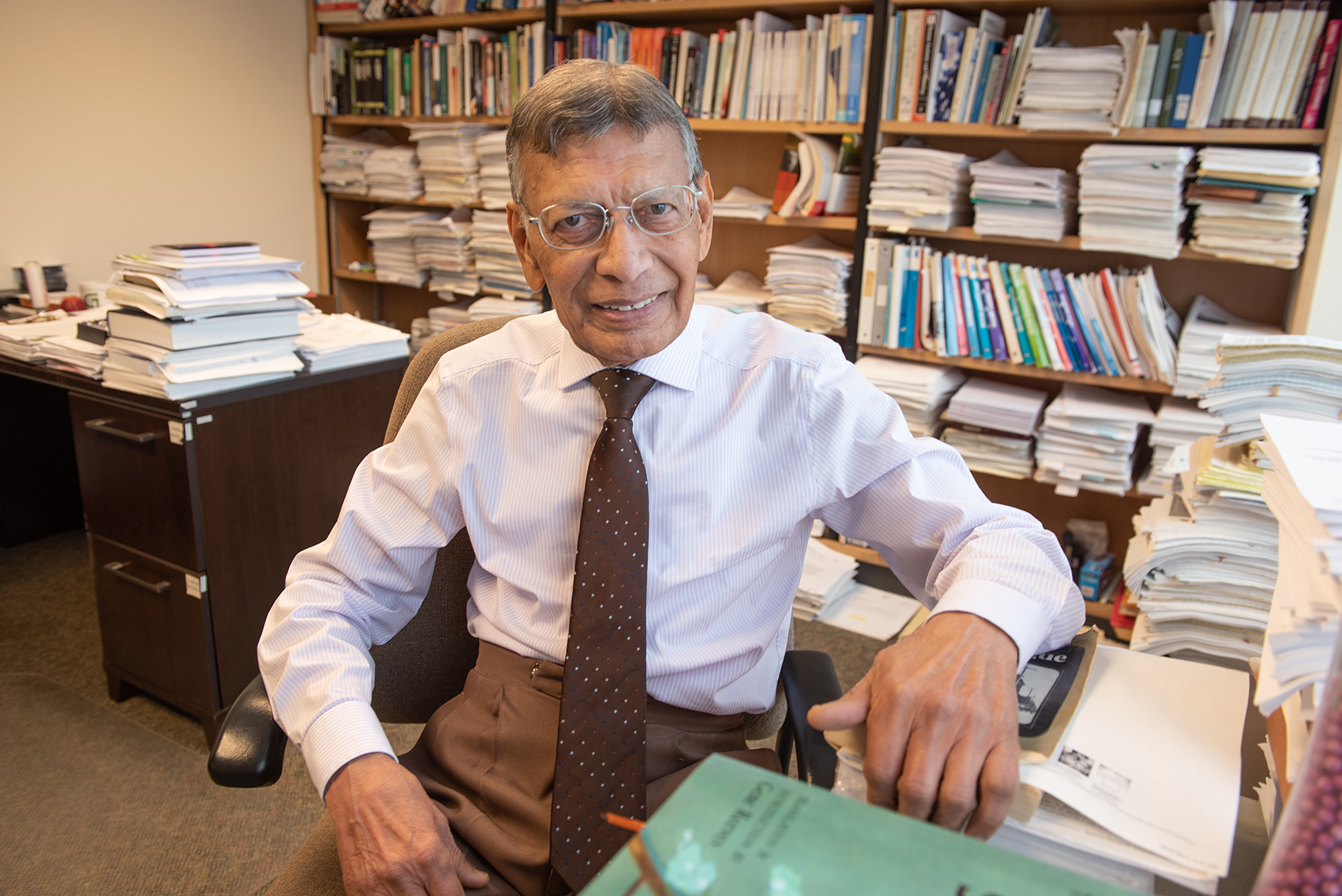Every day, Dr. Rati Ram climbs the 72 steps to the fourth floor of Stevenson Hall, where his office overlooks the Quad. He arrives at about 3 p.m. and stays until nearly 11 p.m. He’s the last person to leave the building each night.
The Distinguished Professor of Economics is 85 and works 365 days a year for one simple reason. “This is my job.”
Like that should explain it.
“I’m here seven days a week because I have no place else to go, and even then I’m behind,” he said, laughing.
Ram started school when he was 4, which means he’s been in a classroom for 81 years.
He was born on September 10, 1934, in India. His mother was a teacher and thought he was ready for school a year ahead of the 5-year age requirement, so she fudged his birth year. Ever since he’s stuck with 1933 as the year he was born.
Ram earned his master’s in philosophy and economics at the University of Delhi in India. In 1972 an attractive fellowship drew him to The University of Chicago, where he earned his master’s and doctorate in economic education.
Ram joined the economics faculty at Illinois State in 1977. He taught here for three years before leaving for Washington State University. Two years later, the former dean of the College of Arts and Sciences, Dr. Virginia Lee Owen, recruited him back to Illinois State.
Ram, who was named Distinguished Professor 34 years ago, is teaching two economics courses this semester. Although he’s taught thousands of students over the past four decades, he disagrees that students today are any different than those who came before them.
“That is folklore. I don’t see that much of a difference. The faces, they look the same. And I remember nearly all of them.”
“I can’t imagine the department without him. Rati is one of the kindest people to everyone. It doesn’t matter whether he knows them or not.”—Cindy Caldwell
One of those is Kyler Ummel ’19, an undergraduate who took intermediate and advanced microeconomics courses with the professor. He appreciated Ram’s dry wit, knowledge of economics, and clear expectations.
“There’s no secret what you have to do to be successful in his class,” Ummel said. “Effort determines the grade you’re going to get.”
A couple of times Ummel emailed Ram for help and found him more than willing to give him individual attention.
“He really wants you to come to him,” Ummel said. “And he told us if we needed to get a tutor, he would pay for the tutor.”
Alisina Sadeghi arrived on campus last fall from Iran. Ram made a positive impression on Sadeghi when he started class by asking students where they were from and how they were feeling so far. At the end of class, Sadeghi went to his office and told him he was nervous about exams and grades. Ram advised the student to study and enjoy learning rather than focusing on a grade.
After a disappointing midterm grade, Sadeghi knew he needed help and showed up at Ram’s office as he was getting ready to leave. The professor sat down with the student and worked with him instead.
“He always said to me, ‘Try hard and never give up,’” Sadeghi said. “His advice helped me to handle one of the hardest courses at ISU, and I got an A.”
Department of Economics administrator Cindy Caldwell has worked with Ram for years. Caldwell said he has a great sense of humor, amazing patience, and perhaps the best institutional memory on campus.
“I can’t imagine the department without him,” she said. “Rati is one of the kindest people to everyone. It doesn’t matter whether he knows them or not.”
Ram spends much of his time in his office researching. Along his floor-to-ceiling bookshelves sit neat stacks of papers with colorful tabs. Retirement isn’t out of the question, but it doesn’t appear to be an answer for him either.
“I want to retire, but I can’t think of anything better than to be here,” he said. “This is my first home. I don’t have a bed here, but …” He laughed at the possibility as he looked around his office.
He does have another home. He and his wife, Kaushalya, live in Bloomington and have been married for more than 50 years. They have four children spread out across the country.
It’s the students who keep him working.
“I have a great relationship with students,” he said. “I believe they remember me and I remember them. That is what makes academic life fulfilling. What else do you do? My life is my work.”

